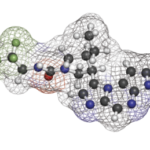 ACR CONVERGENCE 2022—Upadacitinib (Rinvoq) is a Janus kinase (JAK) inhibitor approved by the U.S. Food & Drug Administration (FDA) to treat patients with rheumatoid arthritis (RA), psoriatic arthritis, ankylosing spondylitis, non-radiographic axial spondyloarthritis, atopic dermatitis and ulcerative colitis.1 Upadacitinib inhibits JAK1 and, as an RA treatment, effectively controls inflammation and targets the pathogenic pathways that influence local bone joint homeostasis. Thus, it’s thought that inhibiting JAK1 with upadacitinib may achieve bone erosion repair.
ACR CONVERGENCE 2022—Upadacitinib (Rinvoq) is a Janus kinase (JAK) inhibitor approved by the U.S. Food & Drug Administration (FDA) to treat patients with rheumatoid arthritis (RA), psoriatic arthritis, ankylosing spondylitis, non-radiographic axial spondyloarthritis, atopic dermatitis and ulcerative colitis.1 Upadacitinib inhibits JAK1 and, as an RA treatment, effectively controls inflammation and targets the pathogenic pathways that influence local bone joint homeostasis. Thus, it’s thought that inhibiting JAK1 with upadacitinib may achieve bone erosion repair.
A small study by Ho et al. evaluated whether JAK1 inhibition leads to bone erosion repair in patients with active RA. The researchers performed a non-randomized pilot study comparing bone erosion changes in patients with RA using high-resolution peripheral quantitative computer tomography (HR-pQCT) both before and after treatment with upadacitinib. The data were presented during ACR Convergence 2022.2
Methods: This 24-week study enrolled 20 adults with active RA. Active disease was defined as a Disease Activity Score 28-C-reactive protein (DAS28-CRP) of greater than 3.2 and having at least one bone erosion on HR-pQCT. Patients were prospectively given 15 mg of upadacitinib once daily for six months.
At baseline and month 6, an HR-pQCT scan of the 2–4 metacarpophalangeal head was performed. The study’s primary outcome was the change from baseline in erosion volume on HR-pQCT. Secondary outcomes included changes in disease activity and predictors of response to treatment. Erosion regression was defined as decrease in volume exceeding the smallest detectable change.
The Results
Of the 20 patients enrolled in the study, the mean age was 52 ± 12 years. Women comprised 70% of the patients (n=14), with a mean disease duration of 3.5 ± 5.9 years. At baseline, patients had a DAS28-CRP of 4.5 ± 0.98 and 11 patients (55%) had inadequate responses three or more conventional synthetic disease-modifying anti-rheumatic drugs (csDMARDs).
At week 24, researchers observed significant improvement in the mean DAS28-CRP score (-1.75, P< 0.001). The HR-pQCT scans revealed erosion regression in eight patients (40%). No significant change was found in the overall median erosion volume before and after upadacitinib treatment (0.07 [-0.90–0.76 mm3], P=0.904). The bone erosion deterioration was less obvious when compared with a historic cohort of 20 patients of similar age and disease activity on csDMARDs (median erosion volume change in six months: 0.67 mm3).
Patients were stratified according to their exposure to csDMARDs. After this stratification, a significantly higher proportion of patients with less exposure to csDMARDs had volume regression in at least one bone erosion when compared with patients for whom multiple csDMARDs had proved inadequate (75% vs. 25%, P=0.04). Also, patients with less exposure to csDMARDs experienced improvement in the mean total erosion volume than patients for whom multiple csDMARDs had proved inadequate (2.09±7.62 mm3). These latter patients had a worsening mean erosion volume.



